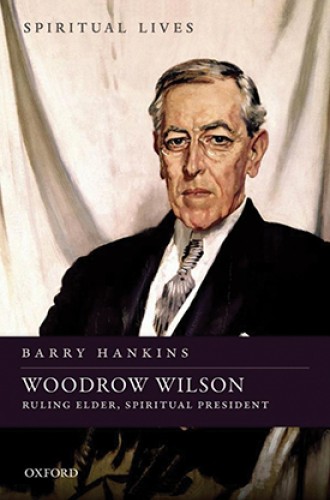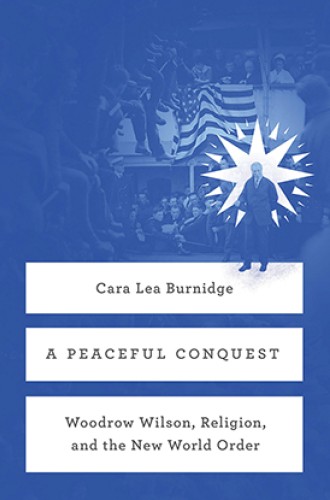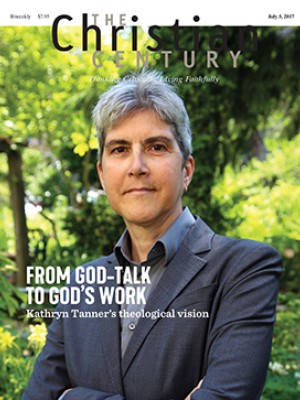Woodrow Wilson’s troubling faith
Wilson adopted a brand of social Christianity that justified white supremacy and more.
A century ago there was a Presbyterian in the White House who cut a dramatically different figure than the one we have today. Woodrow Wilson, the son of a southern preacher, was a serious academic not long removed from his tenure as president of Princeton University. In the rarefied halls of the Ivy League he had honed the idealistic vision for which his presidency of the United States is best remembered. Wilson launched the nation into World War I just over 100 years ago, not with jingoistic bombast but with the memorable declaration that “the world must be made safe for democracy.” In our present moment, a resurgence of idealism in Washington might sound almost too good to be true, but two new studies of Wilson leave no doubt that we should be careful what we wish for.
Barry Hankins’s book is the first entry in Oxford University Press’s Spiritual Lives series, which “features biographies of prominent men and women whose eminence is not primarily based on a specifically religious contribution.” In this slim and eminently readable volume, Hankins deftly narrates Wilson’s 67-year journey from Staunton, Virginia, where he was born in 1856, to Princeton, the White House, and beyond.
Read our latest issue or browse back issues.
Wilson emerges as a formidable but deeply flawed man, who “lived out half his religious heritage, while betraying the other half.” The relevant heritage in this case was southern Presbyterianism, which exerted considerable sway over Wilson’s early thinking but was gradually overtaken, in Hankins’s view, by a generic and theologically deficient liberal Protestant faith. While a student at Princeton in the late 1870s, Wilson penned a series of essays that reflect a significant depth of engagement with the Reformed tradition, but he went on in the first decade of the 20th century to preside, as university president, over the institution’s rapid secularization. The latter seems puzzling given Wilson’s avowal that universities of every type were most likely to flourish if “informed with the spirit of religion . . . the religion of Christ.” Hankins squares the circle by arguing that when Wilson spoke of religion in the latter context he meant, above all, morality. The scandalous particulars of Christian doctrine were out of place in a university that understood its mission as being “in the nation’s service.”
As Wilson moved from the academy into politics, first as the governor of New Jersey and then as the president of the United States, he brought this ethically oriented faith with him. “What mattered for him, whether in politics or religion,” Hankins writes, “was doing good.” But Wilson was no stranger to evil. Wilson’s sympathetic racial rhetoric during the 1912 campaign won him more black votes than any previous Democratic candidate, but he went on to strengthen and defend the Jim Crow order, earning the enmity of civil rights leaders everywhere. In Hankins’s story, Wilson’s cynicism on race is the exception to the idealistic rule.
In Wilson’s initial pacifism and in his stirring call to war, not to mention his aggressive efforts to shape the postwar order—which are recounted hastily here to make room for a chapter on his emotional affair with Mary Allen Hulbert Peck—Hankins finds evidence of an overeagerness to conflate Christianity and democracy, as well as a naive view of human nature. “Wilson’s optimism concerning the power of humankind to do good hailed not from his Reformed heritage but from liberal theology, the Social Gospel, progressivism, and, ultimately, the romantic spiritualization of religion to the point that it existed everywhere and therefore nowhere.”
Cara Lea Burnidge confirms some aspects of Hankins’s critique and troubles others. Her book focuses on Wilson’s international agenda during his presidency, which she persuasively contends represented “the social gospel applied to foreign policy.” While Burnidge finds, like Hankins, that Wilson largely evacuated Christian theological language from his public work, she shows that his faith was—sometimes for better but more often for worse—hardly without substance.
Brilliantly situating Wilson as a member of the early 20th-century social Christian elite, Burnidge describes how the white supremacism he absorbed in his youth dovetailed seamlessly with the imperialistic vision of international affairs embraced by many leaders within the Federal Council of Churches. For Wilson and many of his fellow white male social gospelers, “social stratification based on distinctions of race, class, and gender was not counter to the spirit of democracy but rather an integral part of it by providential design.” Far from aberrant, Wilson’s support for Jim Crow on the domestic front was in this important sense of one piece with his crusading international idealism. “His effort to spread democracy, then, was an enterprise qualified by a particular type of democracy, born in America and made more perfect through the ‘civilizing’ force of his Christianity.” Although Wilson’s international advocacy, including his famous Fourteen Points, appeared to reflect a universal vision of human rights and national self-determination, his values and vision were inescapably bound up in the racialized and gendered colonial politics of the day.
Hankins’s biography advances a common evangelical critique of liberal Protestantism: it traded the sturdy faith of its ancestors for something more sentimental, if not outright vapid. Burnidge more convincingly argues that beneath the veneer of Wilson’s secular rhetoric lay a robust and widely shared Christian vision. There is nothing to celebrate in this realization. It was a faith that sanctified the oppression of countless millions at home and abroad. Far from a ramshackle waystation on the road to secularism, Wilson’s brand of social Christianity was as carefully conceived and ardently believed as its more theologically conservative counterparts.
Amid the current global resurgence of nationalism and realpolitik, Hankins and Burnidge vividly remind readers that universalizing idealisms have dangers of their own.
A version of this article appears in the July 5 print edition under the title “Wilson’s troubling faith.”








